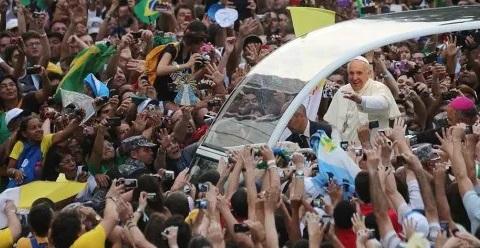Brazilian Catholics find themselves sharply divided in the wake of former President Jair Bolsonaro’s recent conviction, highlighting deep political and ideological fault lines within the country’s largest religious community. As news of the verdict reverberates across Brazil, reactions among Catholic leaders and laypeople vary widely, reflecting broader national debates over justice, governance, and morality. This split underscores the complex relationship between faith and politics in Brazil’s evolving democratic landscape.
Brazilian Catholic Community Reacts to Bolsonaro’s Conviction with Deep Divisions
The recent conviction of former President Jair Bolsonaro has ignited a wave of contrasting emotions within Brazil’s Catholic community, reflecting a nation deeply polarized by politics and faith. Many conservative parishioners emphasize Bolsonaro’s promotion of Christian values and view his legal troubles as politically motivated attacks. They have rallied in prayer and public demonstrations, insisting that his conviction threatens what they see as Brazil’s moral and religious foundation.
Conversely, progressive Catholics express relief and hope that the conviction marks a turning point toward justice and accountability in a country where corruption and polarization have often overshadowed social progress. Church leaders from this faction highlight the need for reflection on the alignment between political leadership and the Gospel’s call for compassion and integrity.
- Supporters: Defend Bolsonaro’s faith-driven policies and decry judicial bias.
- Opponents: View the verdict as a necessary step toward ethical governance.
- Moderates: Call for unity and healing amid growing divisions.
| Perspective | Main Concern | Common Activity |
|---|---|---|
| Pro-Bolsonaro | Preserving traditional values | Prayer rallies and petitions |
| Anti-Bolsonaro | Demanding justice and reform | Advocacy and education |
| Moderate Catholics | Promoting reconciliation | Community dialogues |
Impact of the Conviction on Church-State Relations and Political Alignments
The conviction of Jair Bolsonaro has ignited a fierce debate within Brazil’s Catholic community, revealing deeper fissures in the historically entwined relationship between the Church and the state. For many conservative Catholics, the verdict is perceived as a direct challenge to their political values and religious identity, fostering a sense of betrayal by ecclesiastical authorities who have either openly criticized or distanced themselves from Bolsonaro. Conversely, progressive sectors within the Church interpret the conviction as a necessary step toward accountability and moral integrity, urging a reexamination of the Church’s role in political endorsements and urging greater separation to avoid partisanship.
Key repercussions on church-state dynamics include:
- Heightened polarization among Catholic voters, disrupting traditional political alignments.
- Increased scrutiny of religious leaders’ political engagements and sermons influencing electoral behaviors.
- Mobilization of grassroots Catholic groups advocating for social justice and democratic values against authoritarian tendencies.
| Impact Area | Pro-Bolsonaro Catholics | Progressive Catholics |
|---|---|---|
| Political Alignment | Reinforced conservative loyalties | Shift toward center-left coalitions |
| Church Authority | Distrust in bishops and clergy | Support for reform-minded church leaders |
| Social Engagement | Focus on traditional family values | Emphasis on human rights and social equity |
Navigating the Future: Recommendations for Dialogue and Reconciliation Among Brazilian Catholics
Amid the profound polarization within Brazilian Catholic communities following the controversial conviction of former President Jair Bolsonaro, it is imperative to promote platforms for open and compassionate dialogue. Engaging parish leaders, theologians, and laypeople in conversations that prioritize empathy over partisan loyalty can foster a more unified faith experience. Emphasizing shared spiritual values rather than political identities may bridge gaps and mitigate tensions, allowing the Church to serve as a sanctuary of peace rather than division.
Key recommendations for moving forward include:
- Inclusive Forums: Establishing safe community spaces where diverse opinions can be respectfully exchanged.
- Educational Initiatives: Promoting teachings on Catholic social doctrine that emphasize reconciliation and justice.
- Clergy Mediation: Empowering priests and bishops to act as neutral facilitators in local disputes.
- Inter-Generational Dialogue: Encouraging conversations between different age groups to address varied perspectives with openness.
| Recommendation | Purpose | Expected Outcome | |
|---|---|---|---|
| Inclusive Forums | Facilitate open conversations | Reduced polarization | |
| Educational Initiatives | Promote Catholic values | Enhanced understanding | |
| Clergy Mediation | Clergy Mediation | Facilitate neutral conflict resolution | Improved community cohesion |
| Inter-Generational Dialogue | Bridge age-related perspectives | Greater mutual respect |




